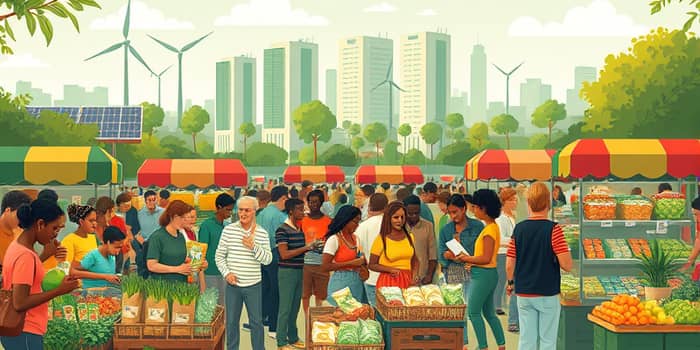
In today’s interconnected world, the choices we make at the checkout counter carry far more weight than ever before. Ethical consumerism transforms individual decisions into collective momentum, shaping markets and influencing corporate behavior on a global scale.
Every product we embrace can contribute to a more sustainable future, illustrating how every purchase has transformative power when guided by conscience and awareness.
The global ethical and sustainable consumer goods market was valued at $293.8 billion in 2023, underscoring its significant role in the international economy. With a compound annual growth rate (CAGR) of 10.7%, this sector continues to outpace traditional markets, driven by evolving consumer values and broader accessibility.
Forecasts indicate that certain segments may achieve a CAGR of 12.8% through 2033, demonstrating sustained demand for products that prioritize people and planet alongside profit.
Approximately 89% of global consumers report having adjusted their habits to incorporate more eco-friendly practices, reflecting a cultural shift towards conscientious living. In the United States alone, eco-friendly retail spending is projected to reach $217 billion by 2025, accounting for 19.4% of total retail sales.
By 2032, this share is expected to climb to 23%, demonstrating the enduring appeal of ethically marketed products. A striking 80% of consumers worldwide express willingness to pay a premium—up to 5% more—for sustainably produced goods, highlighting how eco-friendly shopping’s share of U.S. spending can drive transformative market changes.
Several factors converge to fuel the rise of ethical consumerism:
Moreover, digital advocacy and influencer engagement amplify information sharing, equipping buyers with the knowledge to align purchases with personal values. Brands that prioritize authenticity and measurable impact cultivate deeper loyalty and attract new demographics.
Recognizing the competitive advantage in sustainability, 70% of new products launched in 2024 carried eco-friendly credentials, while corporate sustainability reporting tripled between 2016 and 2023. Companies are increasingly measured by their commitment to environmental and social governance.
Supply chain transparency has become a non-negotiable expectation, and businesses that fail to articulate clear, verifiable practices risk alienating their customer base. Industry leaders are demonstrating how visible environmental and social initiatives can strengthen trust and brand reputation.
Certain industries exemplify rapid growth driven by ethical consumption. In the United Kingdom, solar panel sales soared by 282% in 2022, while the second-hand clothing market expanded by 49%. Sustainable fashion has gone mainstream, and circular economy models are reshaping electronics and garment sectors.
The food and beverage industry benefits from fair trade and organic certifications, and the personal care market sees rising demand for cruelty-free formulations. Even household goods now feature biodegradable and non-toxic options, reflecting the breadth of consumer influence.
Despite the positive momentum, the ethical consumerism movement faces several headwinds. Inflationary pressures can offset growth in some regions, and a price premium averaging 27.6% presents an affordability barrier for lower-income demographics.
Furthermore, the prevalence of greenwashing poses a credibility risk, as not all ethical claims are genuine. Consumers may encounter conflicting information about product origins, driving skepticism and the need for robust certification and transparency.
Looking ahead, U.S. eco-friendly spending is forecast to exceed $400 billion by 2032, representing nearly one-fourth of total retail expenditure. If 91% of American consumers adopt sustainable shopping habits by 2025, the resulting market leverage could compel entire industries to reform supply chains and embrace circular models.
Developing regions such as Asia-Pacific and Latin America are also poised for dramatic adoption, fueled by urbanization and expanding middle classes. This global ripple effect underscores how eco-friendly spending projected to rise can catalyze meaningful change at scale.
Governments worldwide are introducing incentives for sustainable practices and penalties for environmental negligence. Policy frameworks support renewable energy adoption, responsible sourcing, and waste reduction, creating a regulatory backdrop that favors ethical consumers.
Simultaneously, NGOs and grassroots campaigns drive awareness through certifications like Fair Trade and eco-label programs. Corporate reporting on Environmental, Social, and Governance (ESG) metrics has become mainstream, holding brands accountable and informing investor decisions.
Ethical consumers represent a formidable force, capable of steering markets toward sustainability and social justice. By making informed choices, individuals not only fulfill personal values but also contribute to broader economic and environmental well-being.
As we stand at this pivotal moment, it is clear that every purchase has transformative power. Embracing the movement of ethical consumerism unlocks untapped potential, paving the way for a resilient, equitable future.
References





